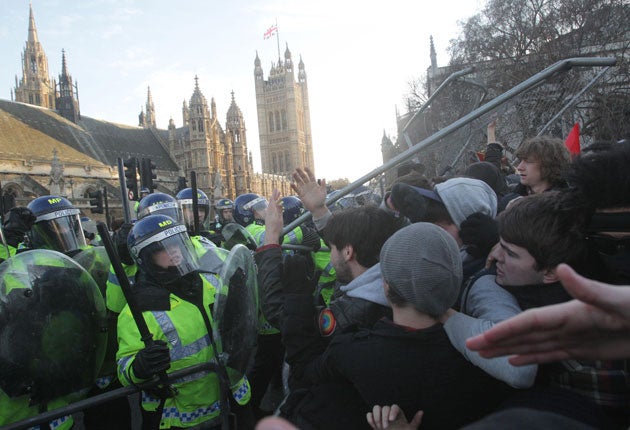Police 'kettling' under fire as May refuses to rule out water cannon

Theresa May, the Home Secretary, has refused to rule out the use of water cannon for the first time in Britain if future student demonstrations result in further violence.
There were renewed demands last night for an urgent rethink of the policing of student protests as the Government admitted that even more severe methods of clamping down on demonstrators could be used. Police have been repeatedly criticised for their use of "kettling" to contain protesters. However, the Home Secretary suggested that tougher measures could be used by police following last week's violent clashes.
She refused to rule out the use of water cannon, despite previous Scotland Yard investigations which found they were too cumbersome to use during such chaotic events.
Ms May was speaking on Sky TV yesterday as the Independent Police Complaints Commission (IPCC) prepared to begin a fourth official investigation. About 50 official complaints have been received so far about the way police have dealt with four protests since the start of November.
"Kettling" was the tactic deployed during last Thursday's rally outside the Commons against the Government's decision to sanction a tripling of tuition fees. Many peaceful protesters, some under 18, say the tactic meant they were trapped on Westminster Bridge late into the night.
Ms May's warning comes as school children, teachers and unions take to the streets of London today to voice their anger at the Coalition's decision to abolish the education maintenance allowance (EMA), given to poorer students as an incentive to stay in full-time education. More than 7,000 people have joined a campaign to save the EMA.
Tomorrow, student activists will also attempt to "kettle" Scotland Yard itself in protest at the continued use of the tactic.
Ms May defended the "robust" approach police took to dealing with Thursday's protest, which led to injuries among officers and students, as well as 35 arrests. "The Met Police obviously have to look at how they should be dealing with these demonstrations," she said. "They will look across the board and they will be making operational decisions. What is absolutely crucial is that for those who did inflict criminal damage, for those who were breaking the law, that they should now feel the full force of the law on them," she told Sky News. She is to address MPs today in the Commons on the policing of tuition fee protests.
Mark Bergfeld, a member of the Education Activist Network who was held in a kettle on Thursday, said protesters were "treated like animals" by police. "It's astonishing how they could attempt to do this. People have the right to protest over an issue like this."
The Metropolitan Police has refused to talk publicly about any change in approach. But the Home Secretary's remarks were seized upon by campaigners arguing that police were crossing the line between keeping the peace and limiting the right to free protest.
"Britain and its best policing traditions are envied around the world because we don't generally resort to the kind of military tactics used by less democratic regimes elsewhere," said Shami Chakrabarti, director of the human rights group Liberty.
"In any event, operational policing decisions are best left to independent professionals and not to the political pronouncements of any party in the House of Commons."
Police were criticised for allowing protesters to vandalise the car of the Prince of Wales and the Duchess of Cornwall, although some who took part in the protest claim the incident is being used to justify tougher action by police in the future.
Brian Paddick, the former deputy assistant commissioner at the Metropolitan Police, said the force had previously looked at the use of water cannons, which they'd found unworkable.
"We evaluated water cannons years ago and found they took too long to fill up. In a situation such as the attack on Charles and Camilla, when protesters were mixing with Christmas shoppers, it would be difficult to use."
He also said the inability of police to separate violent and peaceful protesters represented a failure of intelligence gathering. "Police should by now be able to pick out the troublemakers," he said. "Problems come when you contain those who want to protest peacefully, enraging them by treating them as criminals."
The IPCC has received 49 complaints since the first student demonstration last month, with most relating to the Metropolitan Police. Four complaints have so far been received following the 9 December protest.
Join our commenting forum
Join thought-provoking conversations, follow other Independent readers and see their replies
Comments
Bookmark popover
Removed from bookmarks